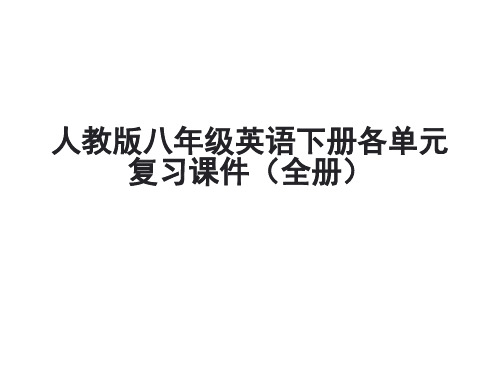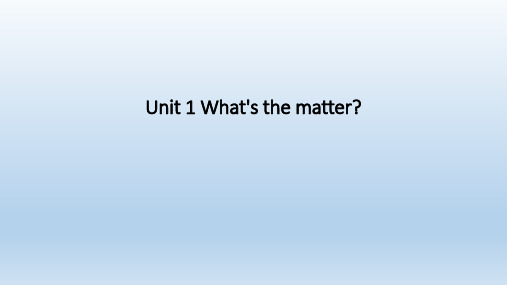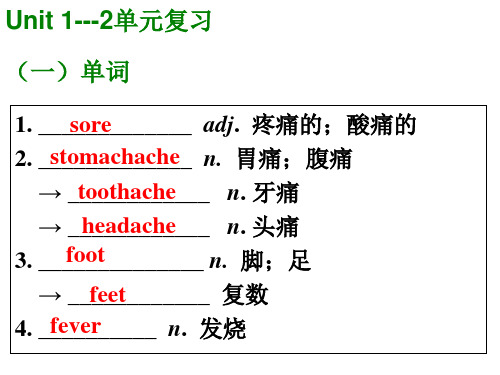人教版2013 八年级英语下册 Units 1—2复习课件
合集下载
人教版英语八年级下Units1-2复习课件(共40张PPT)

►so...that... 【典例在线】
He is so young that he can't look after himself.他太小了无法照顾自己。 【拓展精析】
so...that...表示“如此……以至于……”,常引导结果状语从句。其中so 是副词,常用来修饰形容词或副词。
【活学活用】
►used to do sth.,be used to doing sth.,be used to do sth. 【典例在线】
He used to play basketball after school.他过去常常在放学后打篮球。 The teacher is used to going to bed late.那位老师习惯于晚睡。 This computer is used to control all the machines.这台电脑是用来控制所有机器 的。 【拓展精析】 used to do sth.表示“过去常常做某事”,指过去经常性的动作或存在的状态, 现在已不再那样,侧重与现在的比较;to后用动词原形。其否定句为:usedn't to或didn't use to;其疑问句为Used+主语+to do...?或Did+主语+use to do...?
30.call up 打电话给(某人);征召 31.used to 曾经……;过去…… 32.care for 照顾 33.try out 参加……选拔;试用 34.fix up 修理 35.hand sth. out 分发某物 36.at the age of 在……岁时 37.be excited about 对……感到兴奋
be great fun! A.Pretend B.Promise C.Mention D.Imagine
人教版英语八年级下册Units 1~2单元复习课件

A She ___be shy and quiet.
—Yeah. But now she ___ speaking in front of class. A.used to; is used to B.is used to; used to C.used to; used to D.used to; is used
(217· 湖北十堰中考) 根据汉语提示补全句子。 使他吃惊的是,十堰近几年发生了很大变化。 To his surprise , Shiyan has changed a lot in recent years.
B my plan? 3.(2018· 吉林中考)—Do you agree ___
A pen is used to write.钢笔是用来写字的。 【注意】 used to 意为“过去常常”,其中的 to 是不定式符 号,其后接动词原形。 He used to live in Paris.他过去一直住在巴黎。
4.(2018· 湖南湘西中考改编)—Molly has changed so much!
(2)matter用作名词时,意为“问题,事情”;用作动词时,
意为“要紧,关系重大”,主要用于疑问句或否定句。试比
较: I have a matter to discuss with you. 我有件事情要和你商量。 It doesn't matter.没关系。
C ? 1.(2018· 甘肃兰州中考)Could you please tell me ___ A.where are you from B.how can I get there C.what's the matter with you D.where does he live
人教版八年级英语下册各单元复习课件(全册-共925张PPT)

基础复现天天练workseriously五基础复现天天练monday完形填空sectiona1a2d体裁题材词数难度建议完成时间实际完成时间正确率记叙文健康187words7minmin10基础复现天天练workseriouslythismorningtonydidntgetupasusualhismotherwentintohisbedroomtoseewhatsthe1withhimtonytoldhismotherhedidntfeelwellhehadasort2andabadheadache
基础复现天天练
Work seriously
This morning I got a piece of bad news from QQ.An unlucky__1__ from Fujian died because she didn’t get help in time① when she traveled in Beijing. On April 18th, 2015, the woman took a visit to the Great Wall __2__ a group of friends.But she got lost with her friends later.Then she went to the foot of the Great Wall by __3__.Because it was sunny
重点短语
Work seriously
8.There were many times when Aron almost lost his life because of accidents. 有很多次阿伦因为意外几乎丧命。 9.This means being in a difficult situation that you cannot seem to get out of. 那意味着你陷入一个看起来无法逃脱的困境。
基础复现天天练
Work seriously
This morning I got a piece of bad news from QQ.An unlucky__1__ from Fujian died because she didn’t get help in time① when she traveled in Beijing. On April 18th, 2015, the woman took a visit to the Great Wall __2__ a group of friends.But she got lost with her friends later.Then she went to the foot of the Great Wall by __3__.Because it was sunny
重点短语
Work seriously
8.There were many times when Aron almost lost his life because of accidents. 有很多次阿伦因为意外几乎丧命。 9.This means being in a difficult situation that you cannot seem to get out of. 那意味着你陷入一个看起来无法逃脱的困境。
八年级下Unit1-2复习课件

• 8.casual(adj.)---casully(adv.)
• 9.interview—interviewer—interviewee
• 10.predict(v.)---prediction(n.)
• 11.pleasant(adj.)—unpleasant(反义词)
•
-----pleasure(n.)
1.Tom has a fewfriends though he is new here. 2. Sally feels sad because she has __f_e_w_____ friends in the new
school. 3. Hurry up, there is __li_t_tl_e__ time left. 4. Don’t worry. We still have _a__l_it_t_le___time.
【1-1】[09烟台中考]You should not walk _______outside, especially at night.
A. alone B. lonely C. slowly D. fast
【1-2】I am very _______ because I often work _______in the shop.
____It____ seems that she ___is___ worried now.
【3-2】 —How is Tom today?
—He seems ___________ today than yesterday.
A. happy
B. to happy
C. be happy
D. happier
• 1.argue(v.)—argument(n.)
英语人教版八年级下册复习课Unit1-2

【活学活用】
2)At times,parents find it difficult __D__ with their teenage children.
A.talk
B.talked C.talking D.to talk
►used to do sth.,be used to doing sth.与be used to do sth. 【典例在线】 He used to play basketball after school.他过去常常在放学后打篮球。 The teacher is used to going to bed late.那位老师习惯于晚睡。 This computer is used to control all the machines.这台电脑是用来控制所有 机器的。 【拓展精析】 used to do sth.表示“过去常常做某事”,指过去经常性的动作或存在的 状态,现在已不再那样,侧重与现在的比较;to后用动词原形。其否定 句为:usedn't to或didn't use to;其疑问句为Used+主语+to do...?或Did +主语+use to do...? be used to doing sth.表示“习惯于做某事”,指某动作过去不常做而现在 已习惯做了,强调目前的情况;to为介词,后接名词或动名词。 be used to do sth.表示“被用来做某事”,为被动语态。
23.try out 参加……选拔;试用 24.fix up 修理;装饰 25.give away 赠送;捐赠 26.take after (外貌或行为)像 27.set up 建立;设立 28.make a difference 影响;有作用 29.put up 张贴
人教版八年级下册英语Unit1-2PPT

come up with +主意,观点,想法等,想出 2. care for 关爱 care about 关心 take care! 保重 take care of+sb 照顾某人
3. try out 参加选拔,海选
try on 试穿
try (one's best) to do sth (尽某人最大的努力)去做某事 have a try 去试试吧(常用于口语中) 4. a strong feeling of satisfaction 强烈的满足感 satisfy (v.) 及物动词+sb 令某人满意 to one's satisfaction 令某人满意的是 be satisfied with 对……满意
Unit 1 What's the matter?
Section A
1.What's tha matter with +sb? 2. have a cold
3. have a stomachache
怎么了?
感冒了 胃痛 躺下休息 量体温 休息 三思 令某人吃惊的是
4. lie down and rest
2. be interested in
3. be used to doing 4. because of+ sth 5. run out +(of)
对……感兴趣 习惯于做某事 因为……
耗尽,用完 切断 掌控,控制 继续做某事 冒险做某事
6. cut off 7. be in control of 8. keep on doing sth
Section B
1. take after sb 2. fix up 3. set up 与……长得像 修理
人教版中考英语总复习课件 :八年级(下册)+Units+1-2

2.(2024·预测)The only language that is used bbyy more people is Chinese. 3.Bamboo can not only be used to ffeeeedd(feed) pandas,but also be made
into art works. 4.My grandfather used to tteelll l (tell) me jokes to make me happy when
16.adj.激动的;兴奋的 excitteedd 17.n.仁慈;善良 kindnessss 18.adj.聪明的;聪颖的 cleveerr 19.v.& n.变化;改变 cchhaannge ★cchhaanngee one's miinndd 改变主意 20.n.兴趣;关注 v.使感兴趣;使关注 iinntteerrest
短语归纳 1._h_ahvaevea_cao_lcdo/fldev/feerver__感冒/发烧 2._li_elideo_wdonwn__躺下 3._t_atkaekoen_eo'nset'esm_tpemerpaeturareture__量体温 4._t_atkaekbe_rebarkeas/kas/bar_ebarkeak__休息 5._g_ivgeivuep_up__放弃 6.run out (of )用尽;耗尽 7.ggeett oouutt ooff 离开;从……出来
八年级(下)Unit 2 I'll help to clean up the city parks. 人与社会——社会服务与人际沟通(志愿服务与公共服务)
单词拼写 1.v.义务做;自愿做 n.志愿者 volunteeeerr 2.n.标志;信号 siiggnn 3.n.通知;通告;注意 v.注意到;意识到 nnoottiiccee 4.adj.孤独的;寂寞的 lonellyy 5.pron.几个;数个;一些 severaall 6.n.高兴;愉快 joy 7.n.(尤指长途)旅行;行程 journneeyy 8.v.募集;征集 rraaiise
into art works. 4.My grandfather used to tteelll l (tell) me jokes to make me happy when
16.adj.激动的;兴奋的 excitteedd 17.n.仁慈;善良 kindnessss 18.adj.聪明的;聪颖的 cleveerr 19.v.& n.变化;改变 cchhaannge ★cchhaanngee one's miinndd 改变主意 20.n.兴趣;关注 v.使感兴趣;使关注 iinntteerrest
短语归纳 1._h_ahvaevea_cao_lcdo/fldev/feerver__感冒/发烧 2._li_elideo_wdonwn__躺下 3._t_atkaekoen_eo'nset'esm_tpemerpaeturareture__量体温 4._t_atkaekbe_rebarkeas/kas/bar_ebarkeak__休息 5._g_ivgeivuep_up__放弃 6.run out (of )用尽;耗尽 7.ggeett oouutt ooff 离开;从……出来
八年级(下)Unit 2 I'll help to clean up the city parks. 人与社会——社会服务与人际沟通(志愿服务与公共服务)
单词拼写 1.v.义务做;自愿做 n.志愿者 volunteeeerr 2.n.标志;信号 siiggnn 3.n.通知;通告;注意 v.注意到;意识到 nnoottiiccee 4.adj.孤独的;寂寞的 lonellyy 5.pron.几个;数个;一些 severaall 6.n.高兴;愉快 joy 7.n.(尤指长途)旅行;行程 journneeyy 8.v.募集;征集 rraaiise
人教版八年级下册unit1---2单元知识点复习总结课件

8. I’d like to ... 我愿意……
9. You / He / She / They could do ... 你(们) / 他 / 她 / 他们可以做……
10. ... make it possible to do sth. ……使做某事成为可能。
(四) 交际用语
一、就医(Seeing the doctor) A. What’s the matter / What’s wrong /
→__k_n_iv_e_s____ 复数 20. __m__e_a_n______ v. 意思是;打算;意欲
→_m__e_a_n_t____ 过去式/过去分词
21. _i_m_p_o_r_t_a_n_c_e__ n. 重要性;重要 →_i_m_p_o_r_t_a_n_t___ adj. 重要的
22. _d__ec_i_s_io_n_____ n. 决定;抉择 →__d_ec_i_d_e______ v. 决定
(二)短语
1. __a_ll_w__ee_k_e_n_d_______ 整个周末 2. __a_t _o_n_c_e_/_r_i_g_h_t_a_w_a_y_ 立刻;马上 3. __b_e_i_n_c_o_n_t_r_o_l _o_f___ 掌管;管理 4. __b_e_u_s_e_d_t_o________ 习惯于;适应于 5. __b_y_o_n_e_s_e_lf________ 独自;单独 6. __ca_l_l_u_p_________ 打电话给(某人);征召 7. __ca_r_e__fo_r__________ 照顾;非常喜欢 8. __ch__ee_r__u_p____ (使)变得更高兴;振奋起来 9. __cl_e_a_n_u__p________ 打扫(或清除)干净
9. You / He / She / They could do ... 你(们) / 他 / 她 / 他们可以做……
10. ... make it possible to do sth. ……使做某事成为可能。
(四) 交际用语
一、就医(Seeing the doctor) A. What’s the matter / What’s wrong /
→__k_n_iv_e_s____ 复数 20. __m__e_a_n______ v. 意思是;打算;意欲
→_m__e_a_n_t____ 过去式/过去分词
21. _i_m_p_o_r_t_a_n_c_e__ n. 重要性;重要 →_i_m_p_o_r_t_a_n_t___ adj. 重要的
22. _d__ec_i_s_io_n_____ n. 决定;抉择 →__d_ec_i_d_e______ v. 决定
(二)短语
1. __a_ll_w__ee_k_e_n_d_______ 整个周末 2. __a_t _o_n_c_e_/_r_i_g_h_t_a_w_a_y_ 立刻;马上 3. __b_e_i_n_c_o_n_t_r_o_l _o_f___ 掌管;管理 4. __b_e_u_s_e_d_t_o________ 习惯于;适应于 5. __b_y_o_n_e_s_e_lf________ 独自;单独 6. __ca_l_l_u_p_________ 打电话给(某人);征召 7. __ca_r_e__fo_r__________ 照顾;非常喜欢 8. __ch__ee_r__u_p____ (使)变得更高兴;振奋起来 9. __cl_e_a_n_u__p________ 打扫(或清除)干净
- 1、下载文档前请自行甄别文档内容的完整性,平台不提供额外的编辑、内容补充、找答案等附加服务。
- 2、"仅部分预览"的文档,不可在线预览部分如存在完整性等问题,可反馈申请退款(可完整预览的文档不适用该条件!)。
- 3、如文档侵犯您的权益,请联系客服反馈,我们会尽快为您处理(人工客服工作时间:9:00-18:30)。
A. something
C. nothing
B. anything
D. everything
易混辨异
1. hundred, hundreds of
◎观察思考 They agree it may take hundreds of years.
他们一致认为这可能要花几百年的时间。
Over two hundred students visited the farm last Sunday. 上星期天两百多个学生参观了农场。
◎归纳拓展
even 副词 意为“甚至”,修饰动词或比较级。
even if=even though即使,尽管。
◎即学即用2:
Perhaps you have even seen the characters in movies. 可能你甚至已经在电影上见过这些人物。
3. seem ◎观察思考 It seems that most students hope to have a good education and find a good job. 似乎绝大多数的学生希望得到好的教育和找到一份好的工作。 He doesn’t seem to have many friends. 他似乎没有多少朋友。 He seems nervous at first. 起先他似乎有点紧张。
C . getting D. feeling
( C )(2)She will write to you as soon as she ________ to Guangzhou. A . got C. gets B. will get D. get
重点句型
1. There will be robots in people’s home. ◎典例体验 People will have robots in their homes. 人们将来在家里会有机器人。 I think there will be fewer trees. 我认为树将会更少。
C. anything D. somebody
( D )(2)If you know ________,please tell me as soon as possible. A. something else B. else something
C. else anything
D. anything else
A. happy B. happily
C. angry
(2)It seems that it is going to rain. =It seems
D. angrily
to rain
.
4. send ◎观察思考 She sent me a Christmas card. 她给我寄来一张圣诞贺卡。 ◎归纳拓展 send 动词,意为“发送,寄”, send sth. to sb.= send sb. sth.把某物寄给某人。用法相当于give, show。 send也可意为“派遣,打发”。 相关短语:send for 派人去请。
2. even ◎观察思考 I might even keep a pet parrot. 我甚至可能养一只宠物鹦鹉。 Even if you are with your friends, it is better to keep your voice down in public places. 即使你与朋友 们在一起,最好在公共场合压低声音讲话。 It got even colder. 天气甚至变得更冷了。
I can’t hear anything, there is something wrong with my ears.
我听不到任何声音,我的耳朵出毛病了。 There is nothing serious with you.
你没什么严重的。
Don’t cheat me, I knew anything. 别骗我,我知道任何事。
◎即学即用8:
( B )(1) ________ trees will be planted along the river next month. A. Hundred of B. Hundreds of
C . Two hundreds of D. Two hundreds
( B )(2)There are more than eight ________ students in our school. A. hundreds C. hundred of B. hundred D. hundreds of
第14课 八年级下册 Units 1—2
重点词汇与短语
1. exercise
◎观察思考 David exercises every morning.
大卫每天早晨进行锻炼。
It’s good to do eye exercises every day. 每天做眼保健操对眼睛有好处。
We should take more exercise to keep healthy.
2. alone, lonely
◎观察思考
He was alone at home. 他独自一人呆在家。
He has few friends, he always feels lonely.
他几乎没有ely 与alone的意思比较接近,但在使用时有所区别:
lonely形容词,意为“孤独的”。可指心灵上的寂寞,也可 指偏僻的地点。在句中既可作表语,也可作定语。 alone形容词&副词,意为“单独,独白”,不指心理上寂寞 的感觉。
( D )(3) —Have you brought ________ with you? We won’t have time to come back. —Don’t worry. All the things we needed are here, in this big bag. (2010广州)
◎归纳拓展
hundred, thousand, million, billion为数量单位,当与具体的
数字连用时,本身不加s,其后加名词复数形式。 例如:two hundred cows 两百头奶牛。
当表示不确定数,意为“数以百计、数以千计、数以百万计
要本身加s并与of连用,其后也加名词复数形式。 例如:hundreds of cows几百头奶牛。
疑问句和条件句中;有时可用在肯定句中,意为“无论何事,
任何事”。 nothing意为“没有任何东西”。 everything 意为“所有东西,一切”。 注:当形容词修饰这四个不定代词时,常后置。
◎即学即用7:
( A )(1)There is ________ in the bag. It’s empty.(2011长沙) A. nothing B. something
◎即学即用9: She was taken to a lonely island, lived alone , but she never felt lonely . 她被带到一个荒岛上,独自居住,但她从不感到寂寞。
3. in, after ◎观察思考 He will leave for Beijing in a week. 一周后他会动身去北京。 He left for Beijing after a week. 一周后他动身去了北京。
◎即学即用4: ( B )(1)My uncle ________ me ________a birthday present every year. A. send; to C. sent; with B. sends; D. send; for
( C )(2)Please ________ a doctor at once, he is ________ hurt. A. send; badly B. send; bad C. send for; badly D. send for; bad
◎归纳拓展
in 与 after 都可以表示时间,“in+一段时间”,用来表示从现
Would you like something to drink?
你要一些喝的吗? Everything is ready. 一切都准备好了。
◎归纳拓展
something,意为“某事,某物”,常用在肯定句中; 用在疑
问句中表示请求、客气的询问。 anything意为“某事,某物,任何事”,一般用在否定句、
◎归纳拓展
一般将来时:will+动词原形,表示“将要做什么”。表有计
划性进行的时候可用be going to 代替will。 否定式:will not(won’t) do
一般疑问式:Will sb/sth. do
there will be...=there is going to be... 是there be 句型的一般将 来时,意为“(某地/某时)将会有……”。
我们应该多做运动来保持健康。
◎归纳拓展
exercise动词,意为“运动,锻炼”;名词,意为“体育锻
炼、运动、体操、练习题”等。指具体运动或体操时是可 数名词;泛指运动时是不可数名词。 ◎即学即用1: Doing morning exercises is good for our health. 做早操有利于我们的健康。
back 回来,get along(on) with sb. 与某人相处,get lost迷路,get out of从……出来,get together相聚;聚会, get dressed穿衣服,
get to do sth. 有机会做某事,get over克服。
◎即学即用5:
( C )(1)It’s ________ rather cold. I shall put my jacket on. A. starting B. looking
5. get 短语 ◎观察思考
